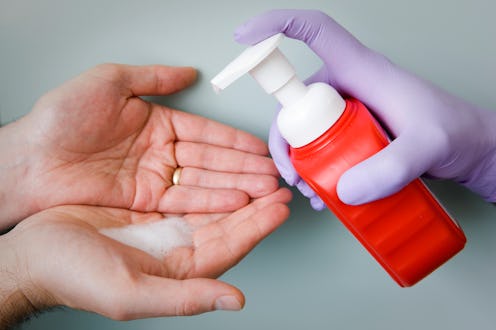News
What Is A Coronavirus ‘Super-Spreader’ & How Concerned Should We Really Be?

The panic surrounding coronavirus seems to grow by the hour, and while the concern is understandable, there's plenty of alarmist language flying around that could easily cause more harm than good. One such phrase is that of the 'super-spreader', followed swiftly by the 'super-shedder'. But what is a coronavirus 'super-spreader'? And how concerned should we really be?
The term is in popular use after Steve Walsh, a businessman from Brighton, allegedly passed the virus on to 11 people after returning to the UK from a business trip in Singapore, via the French Alps, last month. Now in an isolation unit at St Thomas’ Hospital in central London, Walsh has been confirmed as the primary spreader of coronavirus in the UK.
But what is a coronavirus 'super-spreader'?
It is important to point out that the term is not scientific. It is a vague term used to describe an individual who infects "more people than usual". As per the BBC, on someone with the virus will on average infect between two to three people. Walsh, who infected 11 individuals, has spread the virus further than is "normal" and, thus, labelled a 'super-spreader'.
Why do some people 'spread' more?
Some individuals - by virtue of where they live or what they do – come into contact with more people, and therefore statistically have a greater chance of spreading infection further.
As per CNBC, the factors of what makes one individual more likely to 'spread' than another is far more complicated than that. Biology plays a significant role. "A person may produce more of a virus or get infected with a strain that spreads more easily or rapidly, and therefore infect more people. Or, if someone has a compromised immune system, they may not recover as fast as other people, so they keep spreading the infection for longer."
Some people are also considered to be 'super-shedders,' meaning they release unusually large amounts of a virus (or other bug), and thus are more likely to infect people they come into contact with.
Read more here:
The Major Events Cancelled Due To Coronavirus
Want To Stop Touching Your Face? Wear Your Glasses
Are super-spreading events a big deal?
While it's important to maintain perspective and not panic, 'super-spreaders' can have a significant impact.
"[Super-spreading] plays a big role at the beginning of any outbreak, when the virus is trying to get established," Dr John Edmunds, from the London School of Hygiene and Tropical Medicine, told BBC News. In 2015, a "super-spreading event" led to 82 people being infected with Middle East respiratory syndrome (Mers). The Ebola epidemic in West Africa is another such example, where the majority of cases came from a very small handful of patients.
However, "super-spreading of the new coronavirus would not be a surprise and will not significantly change how the disease is managed," according to the BBC.
Do you need to worry about super-spreaders?
It is important not to demonise so-called 'super-spreaders,' as it absolutely is not that person's fault. "They haven't done anything wrong, this is an infection picked up through no fault of their own," Dr Nathalie MacDermott, from King's College London told BBC News.
If you suspect you are unwell due to a virus such as coronavirus, you should contact the NHS in order to confirm the diagnosis ASAP and thereby limit the spreading. But bear in mind that "super-spreaders are also relatively rare," Amesh Adalja, senior scholar at the Johns Hopkins University Center for Health Security and member of the Infectious Disease Society of America, told CNBC Make It. Be aware of the symptoms of coronavirus and how it spreads. Wash your hands regularly and, if you are sick or have a compromised immune system, make sure you stay at home.
Read more here:
What's Happening With Coronavirus?
Why Experts Are Saying You Shouldn't Make Your Own Hand Sanitiser
How To Help People Affected By The Coronavirus
If you or someone you’ve been in close contact with appears to have shown or be showing symptoms of coronavirus, which include fever, shortness of breath, and coughing, visit the NHS website in the UK to find out the next steps you should take or visit the CDC website in the U.S. for up-to-date information and resources. You can find all Bustle’s coverage of coronavirus here, and UK-specific updates on coronavirus here.
This article was originally published on